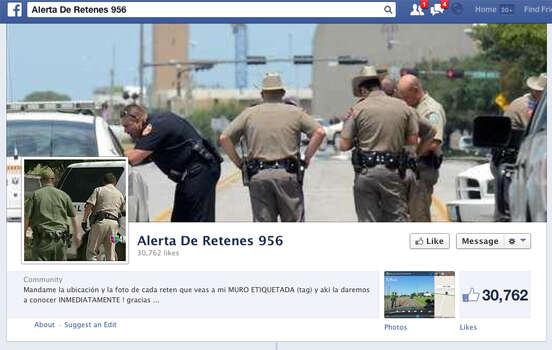Results 1 to 1 of 1
Thread: Checkpoints depend on semantics?
Thread Information
Users Browsing this Thread
There are currently 1 users browsing this thread. (0 members and 1 guests)
-
10-02-2013, 06:57 PM #1
Checkpoints depend on semantics?
Checkpoints depend on semantics?
Express-News Editorial Board : October 2, 2013 : Updated: October 2, 2013 4:46pm
Photo By Associated Press
A Facebook page shows 30,000-plus Likes for a social media campaign in McAllen protesting random checkpoints. Under what reasoning are these stops OK and sobriety checkpoints not?
Photo: Mayra Beltran, Houston Chronicle
No one should be surprised by the angst checkpoints in the Rio Grande Valley have spawned.
It is all well and good that the Department of Public Safety made assurances that these are not immigration enforcement tools. They must not be. Local and state agencies are ill equipped to enforce federal law.
But if the aim is to address the issue of driving without licenses, registration or auto insurance, a modicum of common sense would dictate awareness that this is a condition that affects the undocumented immigrant community in particular.
Texas does not offer driver's licenses for undocumented residents and this can deter people from getting those other items.
In other words, the state profits from undocumented labor but doesn't make it easy for these laborers to get to work.
Sounds like a reason for comprehensive immigration reform to us, but we don't even have to go there to see that this matter of folks driving without licenses and insurance is a conflict on which Texas ought to have an honest discussion, as California has just had.
But under what reasoning are these checkpoints OK and sobriety checkpoints not?
They are thought to be prohibited in Texas because of the state's interpretation of the U.S. Constitution.
A Department of Public Safety spokesman explains, that “traffic regulatory” checkpoints are “an authorized law enforcement strategy that has been held to be constitutionally permissible by the U.S. Supreme Court.”
But the Supreme Court ruled in 1990 that sobriety checkpoints, properly done, are constitutional as well.
Drunken driving is a problem in Texas, one that takes lives. But sobriety checkpoints are deemed unconstitutional, as if they can't be operated under the “traffic regulatory” checkpoint rules.
Our legislators have rejected sobriety checkpoints in Texas, though 38 states allow them.
Puzzling. It is not as if someone approaching a “traffic regulatory” checkpoint can be identified on sight as being without a license or insurance. As with sobriety checkpoints, violations become evident after a stop that occurs under specific rules. And it is not as if a drunk, stopped during a “traffic regulatory” stop, can't be arrested.
It appears that the only thing preventing sobriety checkpoints is what we call them.
A shame. Last we checked, over-imbibing occurs in more than just the Valley.
http://www.mysanantonio.com/opinion/editorials/article/Checkpoints-depend-on-semantics-4863813.phpNO AMNESTY
Don't reward the criminal actions of millions of illegal aliens by giving them citizenship.
Sign in and post comments here.
Please support our fight against illegal immigration by joining ALIPAC's email alerts here https://eepurl.com/cktGTn


 LinkBack URL
LinkBack URL About LinkBacks
About LinkBacks





 Reply With Quote
Reply With Quote


DHS Chief Mayorkas Grilled Over Alleged Flyers Asking Migrants...
04-18-2024, 02:37 AM in illegal immigration News Stories & Reports